Paroxetine and Erectile Dysfunction: Causes and Treatments
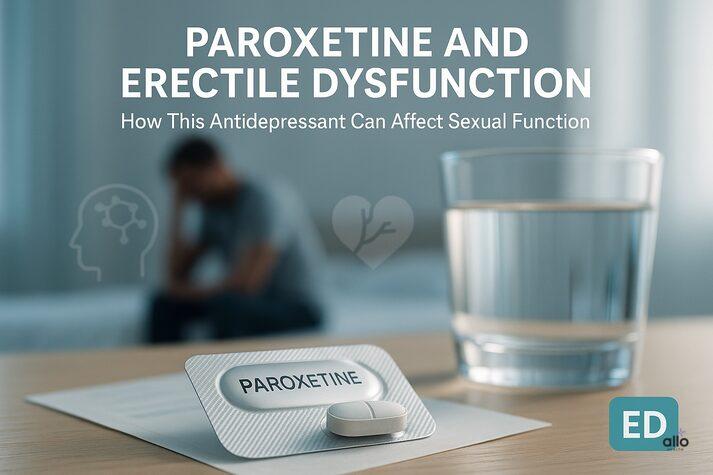
Paroxetine can affect sexual function, and in some men, it may lead to erectile dysfunction (ED) or reduced libido. This happens because the drug alters serotonin and dopamine balance and lowers nitric oxide levels, all vital for sexual arousal and blood flow. The good news is that these effects are usually temporary and reversible. With proper medical guidance, such as dose adjustment, switching antidepressants, or using ED medication, most men can regain normal sexual function without compromising their mental health.
Paroxetine is a widely prescribed antidepressant belonging to the group of drugs called selective serotonin reuptake inhibitors (SSRIs). It helps manage conditions like depression, anxiety, and obsessive-compulsive disorder. However, like other SSRIs, it is also associated with certain sexual side effects, most notably erectile dysfunction (ED).
Paroxetine increases levels of a brain chemical called serotonin, which suppresses dopamine, a key chemical that helps with sexual arousal. It also reduces blood flow to the penis. Together, these changes make it harder to achieve or maintain an erection.
In this article, we’ll explore how paroxetine can cause erectile dysfunction (ED), why it happens, how it compares to other SSRIs, and what can be done to manage or prevent it.
Does Paroxetine Cause Erectile Dysfunction?
Yes, paroxetine can cause erectile dysfunction as a potential adverse side effect. Clinical data indicate that among SSRIs that cause ED, paroxetine has one of the highest rates of sexual dysfunction.
Several clinical trials support this:
- A study of 152 male outpatients, 34% of those taking paroxetine experienced ED. [1]
- Another study of 344 participants reported 64.7% sexual adverse effects with paroxetine, higher than with other antidepressants. [2]
Beyond ED, patients often report decreased sexual desire, reduced sexual satisfaction, and issues with ejaculatory control or orgasm.
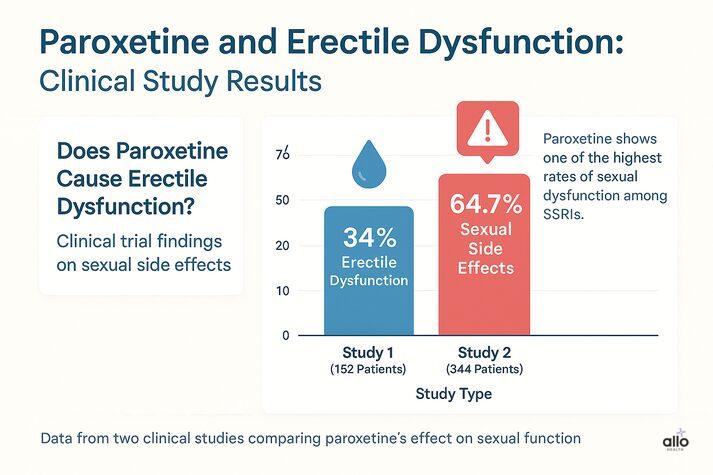
How Does Paroxetine Cause Erectile Dysfunction?
1. Serotonin-Dopamine Imbalance
Normally, after your brain releases serotonin (a chemical that helps regulate mood), some of it is quickly reabsorbed by nerve cells. This process is called reuptake.
Paroxetine blocks this reuptake ( at the 5-HT transporter), so serotonin stays active in the brain for a longer time. This helps improve mood and relieve depression.
However, elevated serotonin then inhibits the release of dopamine. Since dopamine plays a key role in sexual arousal, erection, and orgasm, this reduction can significantly impair sexual functioning and cause ED. [3]
2. Lowering Nitric Oxide Production
Paroxetine suppresses nitric oxide synthase (NOS) activity, the enzyme responsible for producing nitric oxide, a molecule essential for maintaining erections.
Research shows that paroxetine markedly reduces neuronal NOS in penile tissue, limiting the ability to achieve or maintain an erection. [4]
3. Hormonal and Neurochemical Imbalance
Paroxetine can interfere with the body’s natural balance of neuroactive steroids, special brain chemicals that help regulate mood, stress, and sexual desire. These steroids work closely with enzymes that control hormone production, so when their levels shift, it can disturb normal sexual responses like arousal and orgasm.[5]
In addition, paroxetine affects brain chemicals such as norepinephrine and epinephrine (adrenaline). [6] These chemicals help the body respond to excitement, increase heart rate, and direct blood flow during arousal. When their balance is disrupted, it can reduce sexual interest, make it harder to feel physically stimulated.
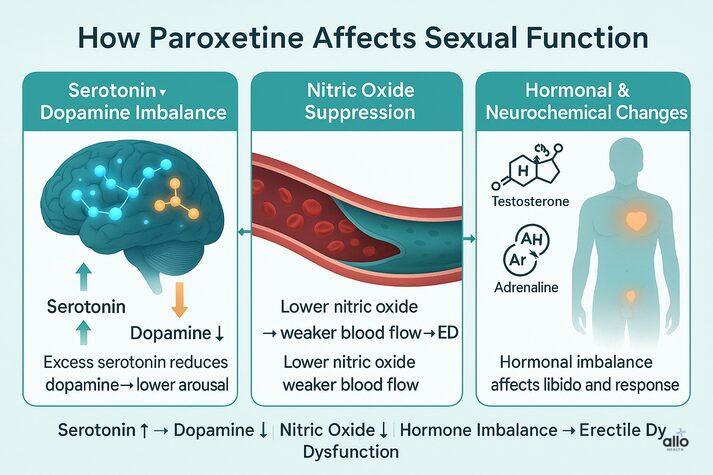
Is ED Caused by Paroxetine Permanent?
In most cases, paroxetine-induced ED is reversible. Symptoms usually improve within a few weeks of dose adjustment or drug cessation. However, in rare instances, a condition known as Post-SSRI Sexual Dysfunction (PSSD) can occur, where symptoms persist long after discontinuation.
Research estimates that roughly 1 in 216 patients may experience long-term effects. [7] In PSSD, men may experience persistent erectile difficulties, genital numbness, or reduced libido, even after stopping the medication.
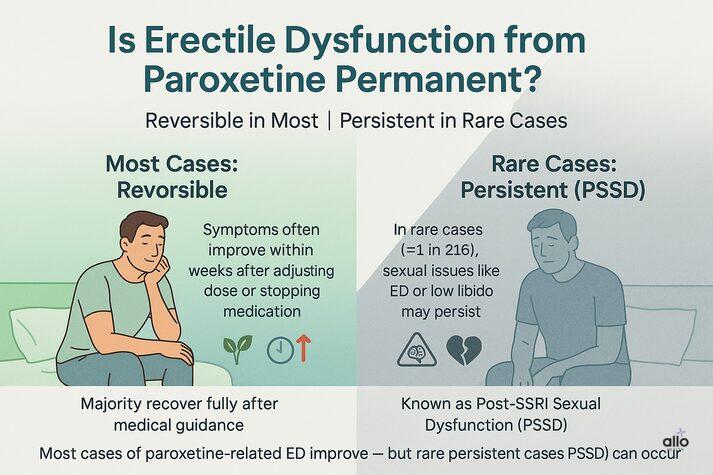
Sexual Side Effects of Paroxetine vs.Other Antidepressants
Among SSRIs, paroxetine ranks as the highest risk for erectile and sexual dysfunction:
|
Risk Level |
Antidepressants |
Typical Sexual Effects |
|
High Risk |
Paroxetine, Sertraline | Erectile dysfunction, delayed ejaculation, low libido |
|
Moderate Risk |
Fluoxetine, Fluvoxamine, Citalopram |
Reduced desire, mild erection issues |
|
Low Risk |
Escitalopram, Vortioxetine |
Decreased libido, mostly reversible |
| Very Low Risk | Bupropion (non-SSRI) |
May improve sexual function |
How to Manage ED Caused by Paroxetine
If you experience sexual side effects, it’s important not to stop paroxetine abruptly. Instead, discuss options with a healthcare provider. Effective treatment strategies include:
1. Dosage Adjustment
Lowering the paroxetine dose often reduces sexual side effects while maintaining antidepressant efficacy. This should always be done under medical supervision.
2. Switching Antidepressants
Alternatives such as bupropion or mirtazapine have minimal sexual side effects. Vortioxetine and agomelatine are newer antidepressants that maintain mood stability with better sexual functioning outcomes.
3. ED Medications:
Adding a phosphodiesterase type 5 inhibitor (PDE5i) like sildenafil, tadalafil, or vardenafil can help restore erectile function:
- Tadalafil has been shown to prevent paroxetine-induced decreases in penile NOS levels. [8]
- Studies report men on tadalafil were 11.5× more likely to experience improved erections. [9]
These drugs work by enhancing the nitric oxide production and improving penile blood flow.
4. Mental Health Support
Different forms of psychotherapy, like Cognitive Behavioral Therapy (CBT), biofeedback therapy, and hypnotherapy, can complement medical interventions. Addressing anxiety, body image, or relationship issues often improves overall sexual satisfaction.
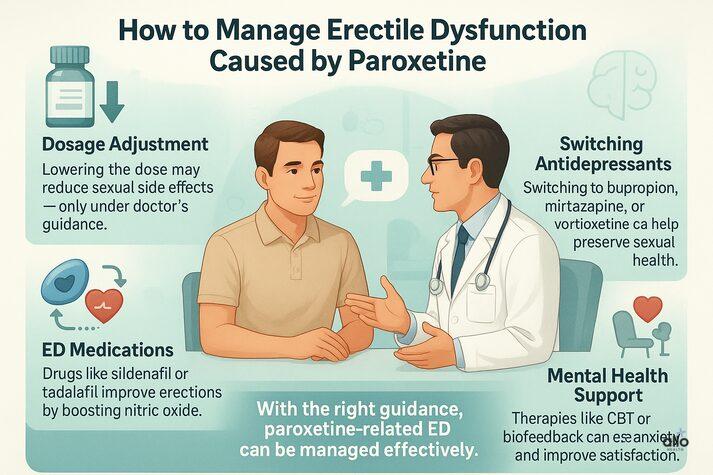
How to Prevent Paroxetine-Induced ED
Preventive steps can significantly reduce the risk of sexual side effects:
- Regular monitoring: Periodically evaluate sexual health to identify issues early.
- Healthy lifestyle: Maintain exercise, sleep, and nutrition as they improve sexual response and vascular health.
- Limit alcohol and smoking: Alcohol and smoking both can worsen medication-related ED.
- Doctor communication: Openly discuss any changes in sexual function with your psychiatrist or sexual health specialist.
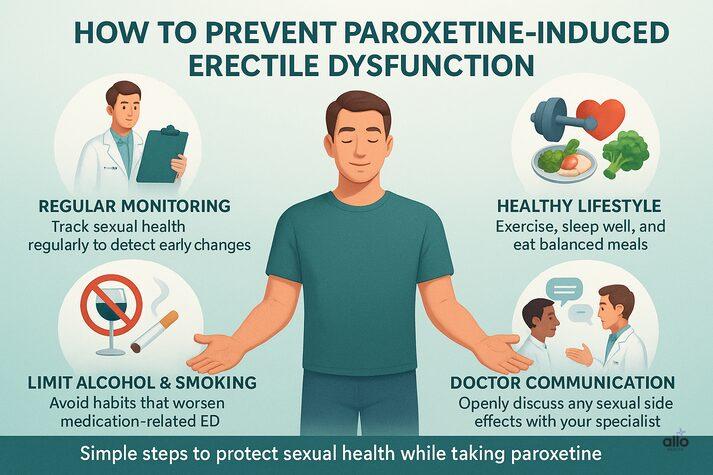
Conclusion
Paroxetine remains an effective antidepressant for many people, but it carries a higher risk of erectile dysfunction and sexual side effects compared to other SSRIs. Most cases are temporary and reversible, but persistent symptoms (PSSD) can occur rarely.
If ED develops, do not stop medication abruptly; instead, consult your healthcare provider.
If you experience persistent ED while taking paroxetine, it’s important to consult a qualified sexual health expert or your prescribing doctor. They can assess whether the symptoms are medication-related, adjust your dosage, or suggest alternatives that support both your mental and sexual health.
"The following blog article provides general information and insights on various topics. However, it is important to note that the information presented is not intended as professional advice in any specific field or area. The content of this blog is for general educational and informational purposes only.
Book consultation
The content should not be interpreted as endorsement, recommendation, or guarantee of any product, service, or information mentioned. Readers are solely responsible for the decisions and actions they take based on the information provided in this blog. It is essential to exercise individual judgment, critical thinking, and personal responsibility when applying or implementing any information or suggestions discussed in the blog."






